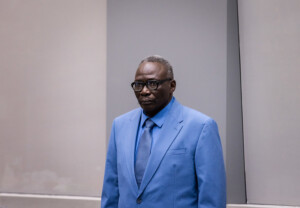Families of martyrs urge Sudan to ratify Rome Statute, hand suspects to ICC
The December 2018* Families of Martyrs’ Families Organisation, in cooperation with the Association of Sudanese Abroad, have launched a popular campaign to demand the ratification by Sudan of the 1998 Rome Statute and the transfer of all indictees to the International Criminal Court (ICC) in The Hague for trial.
 The International Criminal Court in The Hague (File photo: Andrew Bergman / Radio Dabanga)
The International Criminal Court in The Hague (File photo: Andrew Bergman / Radio Dabanga)
The December 2018* Martyrs’ Families Organisation, in cooperation with the Association of Sudanese Abroad, have launched a popular campaign to demand the ratification by Sudan of the 1998 Rome Statute and the transfer of all indictees to the International Criminal Court (ICC) in The Hague for trial.
At a press conference in Khartoum on Wednesday, the organisation announced that 35 entities and organisations in Sudan and abroad have joined the campaign, explaining that the campaign aims to link the cases of the martyrs of the revolution with international justice.
The father of the martyr Abelsalam Kosha confirmed that the violent dispersal of protestors at the sit-in in front of the General Command of the army in Khartoum on June 3, 2019** as a crime against humanity. He lamented the repeated extension of the period of the investigation committee “that sends negative messages”. He pointed to obstacles represented in not rescinding immunities. He indicated that the campaign will continue until April 3.
During the press conference, the speakers, including lawyers and activists, addressed the definition of the Rome Statute and the International Criminal Court, demanding the handover of all wanted persons to the court.
* December 2018 revolution
From mid-December 2018, Sudan experienced a popular uprising called-out by the Sudanese Professionals Association and signatories to the Declaration of Freedom and Change, calling for the overthrow of the regime. Demonstrations were met with violent resistance from the government, however the sheer volume of public support resulted in the uprising reaching critical mass. On April 11, the 30-year dictatorship of Omar Al Bashir was overthrown by a military coup.
Al Bashir and several members of his deposed regime have been arrested and charged for corruption, and their part in government violence against protestors in the lead-up to the coup.
On Saturday, Al Bashir himself was convicted on charges of corruption, and sentenced to two years in a ‘correctional facility’ for older prisoners.
Judge El Sadig Abdelrahman stipulated that Al Bashir’s two-year sentence will commence after a verdict has been reached in another case against him regarding the killing of demonstrators during the protests that led to his removal.
Ironically, Al Bashir, is currently being held in Khartoum’s Kober Prison, which became notorious under his regime for holding countless political detainees, many of whom were tortured or worse.
The ousted president has also been charged with incitement and involvement in the killing of protesters, and this week he was summoned for questioning over his role in the 1989 military coup that brought him to power.
** June 3 massacre
The sit-in in Khartoum was organised on April 6 2019, to pressure the then ruling Omar Al Bashir to step down. Five days later, the dictator was deposed in a military coup. The protestors continued occupying the space in front of the Defence Ministry, calling on the military to cede power to a civilian government.
Two months later, on June 3/Ramadan 29, the people at the sit-in were attacked by government forces. The attacks cost the life of 127 demonstrators. About 700 protesters and others present at the sit-in that day were injured. More than 100 people went missing.
An independent Committee of Inquiry started to investigate the ‘June 3 Massacre’ in October 2019. In March 2020, hundreds of young protestors demonstrated in Khartoum demanding a final report from the committee.











 and then
and then